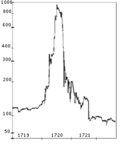Portal:Business
The Business and Economics Portal  Business is the practice of making one's living or making money by producing or buying and selling products (such as goods and services). It is also "any activity or enterprise entered into for profit." A business entity is not necessarily separate from the owner and the creditors can hold the owner liable for debts the business has acquired except for limited liability company. The taxation system for businesses is different from that of the corporates. A business structure does not allow for corporate tax rates. The proprietor is personally taxed on all income from the business. A distinction is made in law and public offices between the term business and a company (such as a corporation or cooperative). Colloquially, the terms are used interchangeably. (Full article...) Economics (/ˌɛkəˈnɒmɪks, ˌiːkə-/) is a behavioral science that studies the production, distribution, and consumption of goods and services. Economics focuses on the behaviour and interactions of economic agents and how economies work. Microeconomics analyses what is viewed as basic elements within economies, including individual agents and markets, their interactions, and the outcomes of interactions. Individual agents may include, for example, households, firms, buyers, and sellers. Macroeconomics analyses economies as systems where production, distribution, consumption, savings, and investment expenditure interact; and the factors of production affecting them, such as: labour, capital, land, and enterprise, inflation, economic growth, and public policies that impact these elements. It also seeks to analyse and describe the global economy. (Full article...) Selected article John Stuart Mill (20 May 1806 – 7 May 1873) was an English philosopher, political economist, politician and civil servant. One of the most influential thinkers in the history of liberalism and social liberalism, he contributed widely to social theory, political theory, and political economy. Dubbed "the most influential English-speaking philosopher of the nineteenth century" by the Stanford Encyclopedia of Philosophy, he conceived of liberty as justifying the freedom of the individual in opposition to unlimited state and social control. He advocated political and social reforms such as proportional representation, the emancipation of women, and the development of labour organisations and farm cooperatives. The Columbia Encyclopedia describes Mill as occasionally coming "close to socialism, a theory repugnant to his predecessors". He was a proponent of utilitarianism, an ethical theory developed by his predecessor Jeremy Bentham. He contributed to the investigation of scientific methodology, though his knowledge of the topic was based on the writings of others, notably William Whewell, John Herschel, and Auguste Comte, and research carried out for Mill by Alexander Bain. He engaged in written debate with Whewell. A member of the Liberal Party and author of the early feminist work The Subjection of Women, Mill was also the second Member of Parliament to call for women's suffrage after Henry Hunt in 1832. Selected image
Selected economyThe economy of India is a developing mixed economy with a notable public sector in strategic sectors. It is the world's fourth-largest economy by nominal GDP and the third-largest by purchasing power parity (PPP); on a per capita income basis, India ranked 136th by GDP (nominal) and 119th by GDP (PPP). From independence in 1947 until 1991, successive governments followed the Soviet model and promoted protectionist economic policies, with extensive Sovietization, state intervention, demand-side economics, natural resources, bureaucrat-driven enterprises and economic regulation. This is characterised as dirigism, in the form of the Licence Raj. The end of the Cold War and an acute balance of payments crisis in 1991 led to the adoption of a broad economic liberalisation in India and indicative planning. India has about 1,900 public sector companies, with the Indian state having complete control and ownership of railways and highways. The Indian government has major control over banking, insurance, farming, fertilizers and chemicals, airports, essential utilities. The state also exerts substantial control over digitalization, telecommunication, supercomputing, space, port and shipping industries, which were effectively nationalised in the mid-1950s but has seen the emergence of key corporate players. (Full article...) Selected quote"However no decentralized pricing system can serve to determine optimally these levels of collective consumption. Other kinds of "voting" or "signalling" would have to be tried. But, and this is the point sensed by Wicksell but perhaps not fully appreciated by Lindahl, now it is in the selfish interest of each person to give false signals, to pretend to have less interest in a given collective consumption activity than he really has, etc. I must emphasize this: taxing according to a benefit theory of taxation can not at all solve the computational problem in the decentralized manner possible for the first category of "private" goods to which the ordinary market pricing applies and which do not have the "external effects" basic to the very notion of collective consumption goods. Of course, utopian voting and signalling schemes can be imagined. ("Scandinavian consensus," Kant's "categorical imperative," and other devices meaningful only under conditions of "symmetry," etc.) The failure of market catallactics in no way denies the following truth: given sufficient knowledge the optimal decisions can always be found by scanning over all the attainable states of the world and selecting the one which according to the postulated ethical welfare function is best. The solution "exists"; the problem is how to "find" it."
TopicsRelated WikiProjectsDid you know (auto-generated) -
On this day in business history
General imagesThe following are images from various business-related articles on Wikipedia.
More did you know
Business news
SubcategoriesRelated portals
Things you can doUrgent and important articles are bold
WikimediaThe following Wikimedia Foundation sister projects provide more on this subject:
SourcesDiscover Wikipedia using portals |









































